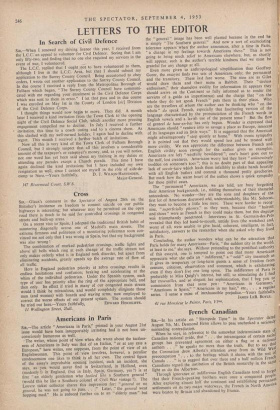Americans in Paris SIR, —The article "Americans in Paris," printed in
your -August 21st issue would have been insupportably irritating had it not been un- consciously humorous as well.
• The writer, whose point of view when she wrote about the tactless- ness of Americans in Italy was that of an Italian, " or at any rate a European," here writes, one supposes, from the point of view of an Englishwoman. This point of ' view involves, however, a peculiar condescension one likes to think is all her own. The central figure of the essay's improbable opening incident, such an incident, she says, as you would never find in Switzerland, in Holland, even (modestly I) in England, (but in Italy, Spain, Germany, yes ?) is at first "an elderly gentleman who looked like a Southern general" (would this be like a Southern colonel of Civil War vintage ?). The Louvre ticket collector shares this impression for:, " general or no general, he was not going to pass. . . ." Later, ," the general went hopping mad." He is reduced further on to an "elderly man" but the " general " image has been well planted because in the end he is simply " The Southern general." And now a sort of excruciating tolerance appears when the author announces, after a time in Paris, a change in my feelings towards Americans there." This is not going to bring much relief to Americans elsewhere, but, as shortly will appear, such is the author's terrible kindness that we must be grateful for any change at all.
Even more given to anthropological simplification than Geoffrey Gorer, the essayist finds two sets of Americans only; the permanent and the transitory. These last fare worse. The men are as Giles would draw them and their name is Babbitt. Their " tireless enthusiasm," their shameless avidity for information (it appears they should arrive on the Continent so fully informed as to render the services of a guide an impertinence) and the charge that " on the whole they do not speak French " puts them in their place. Who are the travellers of whom the author can be thinking who " on the whole " do speak French, especially that fascinating version of the language characterised by the pronunciation of the French words in English vowels and a lavish use of the present tense ? But the flow of genteel de haut-en-bas has only begun. Wonder is expressed that Americans should " venture into so savage a place as Europe, innocent of its languages and its little ways." It is suggested that the American might advantageously " stop quietly at home." With ironic sympathy it is pointed out that they would spend less and be treated with more civility. We can appreciate the difference between French and English civility soon enough for the author gives us examples. Americans are left " wistfully bewildered "; one's heart goes out to the naïf, lost creatures. Americans worry lest they have " unknowingly trodden on someone's toes "; this is no doubt part of that appealing lack of savoir-faire which leads them infallibly to shake hands heartily with all English butlers and commit a thousand pretty gaucheries. But mark how the warm heart of the author shows a quick sympathy for these pitiful cases.
The " permanent " Americans, we are told, are busy forgetting their American backgrounds, i.e., ridding themselves of their shameful antecedents. - No wonder—they are the sons and daughters of the first lot of Americans discussed arid, understandably, like Mr. Salteens, they want to become a little less mere. These were harder to recog- nise, " superficially phoney," as they were, because their " haircut and/ shoes " were as French as they could make them, but this disgui,se wah triumphantly penetrated. Interviews in St. Germain-des-Preys revealed that they led hand-to-mouth, untidy lives (the wretches) and, worst of all, were unable to give lucid, coherent, intelligent, in fact, satisfactory, answers to the researcher when she asked why they lived in Paris.
Concluding, the author wonders what can be the attraction that Paris holds for many Americans—Paris, " the saddest city in the world, at least to me," she says. Without pretending to the pontifical authority of thii essayist, one is tempted to point out that many Americans appreciate what she calls an " indifferent," a " cold " city inasmuch as it gives its temporary or long-term guests a sense of freedom from censure, criticism, observation and comment, which is exhilarating even if they don't live one long spree. The indifference of Paris is preferably to Miss Quigly's interest, but still, so stimulating do I find her trouvailles, and so elegant her sophistication, that I beg you to commission from that same pen : " Americans in Germany," " Americans in Spain," " Americans in my hair," etc., . . . a regular series. I sense a mine of inexhaustible prejudice.—Yours faithfully, JAMES LEB. BOYLE.
41 rue Monsieur le Prince, Paris, VP".


































 Previous page
Previous page